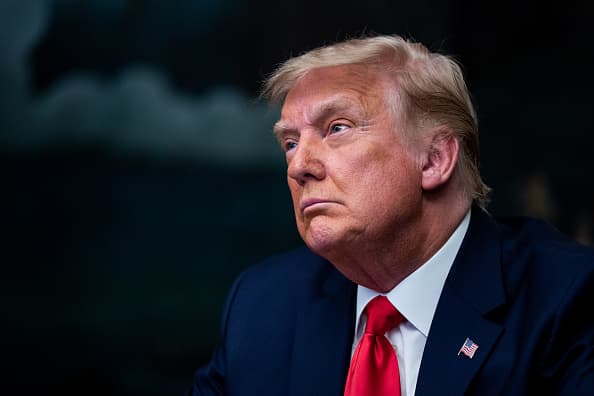
President Donald Trump listens during a White House videoconference with members of military on Nov. 26, 2020.
Erin Schaff | The New York Times | Bloomberg | Getty Images
WASHINGTON – President Donald Trump on Wednesday vetoed the sweeping defense bill that authorizes a topline of $740 billion in spending and outlines Pentagon policy.
“Unfortunately, the Act fails to include critical national security measures, includes provisions that fail to respect our veterans and our military’s history, and contradicts efforts by my administration to put America first in our national security and foreign policy actions,” Trump wrote in a lengthy statement to Congress.
“It is a ‘gift’ to China and Russia,” the president added, without citing specific details.
Earlier this month, the National Defense Authorization Act passed both houses of Congress by veto-proof margins, meaning that any veto by Trump would likely be overridden.
Congress must now vote again to override Trump. Lawmakers are slated to return from the holidays on Monday.
This year’s 4,517-page defense bill, which typically passes with strong bipartisan support and veto-proof majorities, funds America’s national security portfolio. It has been signed into law for nearly six consecutive decades.
The bill’s passage, at the minimum, secures soldier pay raises and keeps crucial defense modernization programs running.
Trump has offered a variety of reasons for opposing the defense bill. Earlier this month, he threatened a veto if lawmakers did not include a measure to eliminate Section 230 of the Communications Decency Act, which protects tech giants like Facebook and Twitter from being held legally liable for what is posted on their platforms. Trump has repeatedly accused Twitter, his social media platform of choice, of unfairly censoring him.
Trump renewed the threat last week.
In his message to Congress, Trump wrote that the NDAA failed ” to make any meaningful changes to Section 230 of the Communications Decency Act.” He called on Congress to repeal the measure.
The president has previously said the measure posed a serious threat to U.S. national security as well as election integrity but did not give any further explanatory details. Trump has also asserted that the bill favors China.
The president’s issue with Section 230 came to light this summer after Twitter added warning labels to several of his tweets that alleged mail-in voting is fraudulent. Trump has still not conceded the election to President-elect Joe Biden.
The NDAA, in its current form, does not include any measure related to Section 230.
Trump has also insisted that the defense-spending bill include language preventing the renaming of military bases commemorating Confederate-era figures.
The Republican-led Senate Armed Services Committee over the summer approved a provision from Sen. Elizabeth Warren, D-Mass., requiring the Pentagon to rename military assets named after symbols of the Confederacy, the group of states that seceded from the U.S. and fought the Union in the Civil War.
Trump, in a multi-tweet post in June, rejected that idea, by contending that the Confederate names of the bases have become part of the nation’s great “heritage.”
“It has been suggested that we should rename as many as 10 of our Legendary Military Bases, such as Fort Bragg in North Carolina, Fort Hood in Texas, Fort Benning in Georgia, etc. These Monumental and very Powerful Bases have become part of a Great American Heritage, and a history of Winning, Victory, and Freedom,” Trump wrote on Twitter.
“The United States of America trained and deployed our HEROES on these Hallowed Grounds, and won two World Wars. Therefore, my Administration will not even consider the renaming of these Magnificent and Fabled Military Installations,” the president wrote.
CNBC’s Kevin Breuninger contributed to this report.




